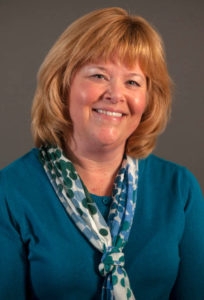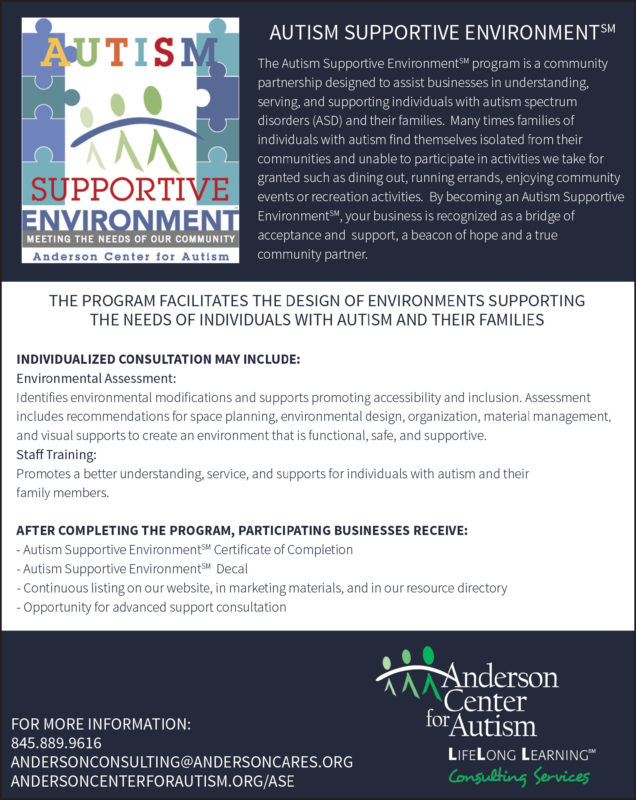Like many professionals who work with people on the autism spectrum, consultants from Anderson Center Consulting, a division of Anderson Center for Autism (ACA), focus on building skills that will help people be successful when engaging in their communities. Community engagement, after all, is often the end goal; that measure of success for which individuals with autism, their families and professionals all strive. Increased and ongoing participation in ones’ community can have a positive impact on social competence and quality of life. Consultants experience satisfaction when individuals with autism reach identified communication or social skills goals and when families appear “ready” to take on the challenge and prepare for family “trips into the community.” However, in spite of all that positive momentum, individuals with ASD and families often report upsetting or disappointing community experiences.

Kathleen Marshall, MA Ed, SAS
What went wrong? Long wait times at restaurants resulting in “meltdowns.” Judgmental looks or comments from grocery store shoppers. A haircut that ends before the scissors actually cut any hair. Feelings of embarrassment, anger, defeat and the longing for a more accepting community.
Increasingly, communities around the world are becoming more accepting and educated about Autism Spectrum Disorder (ASD). Channel Port aux Basques, a little town in Newfoundland did it. Lexington, Kentucky is working on it. Mesa, Arizona is pursuing designation as an Autism Certified Travel Destination. So, Anderson Consultants searched for a way to make it happen locally. It was one of those things where so many forces come together to make something possible. A small grant was secured with targeted dollars and efforts focused on benefitting people in the little Village of Rhinebeck, New York, about 100 miles north of NYC and just a few miles north of Anderson Center’s main campus. Dutchess County Executive, Marc Molinaro, had already occasioned the public’s attention to “Think Differently” in support of all people with disabilities. The immediate welcoming and enthusiasm of such an initiative by Village of Rhinebeck Mayor, Gary Bassett, paved the way toward this community becoming “autism supportive.”
The Village of Rhinebeck Board approved the project and the establishment of the Autism Supportive Community Committee, tasked with planning, identifying goals and facilitating efforts toward establishing the Village as a supportive community. The Committee was comprised of key “stakeholders,” including: Mayor Bassett, School Superintendent, Chamber of Commerce Director, a representative from the local hospital and a physician’s office, a representative from Rhinebeck Masons, a representative of a local business/parent of a child with Autism, “advisors” from ACA and a local communication/marketing business. The Advisors assisted with the development of communication, print material and social media postings. In addition, an Anderson Consulting representative served as facilitator; providing training and advising the Committee on process planning, goal development and data capturing. The Committee identified reasonable goals that included opportunities for village members to learn about the initiative and Autism Spectrum Disorder. Open “education” forums were held during a six-month period at various locations to reach as many village members as possible. A second goal focused on encouraging businesses and organizations to complete a pledge of doing one thing supportive for people with autism which quickly grew into the tag line, “#1Thing.”
Trained “Stakeholder Representatives” went business to business to speak with owners and managers about the project, answer questions and suggest “#1Thing” options. Simultaneously, the local Chamber of Commerce and ACA posted the pledges made, highlighting each business and organization. Social media was also used to communicate the Village’s efforts. For example, a “kick-off” event promoted in November drew interested community members to an Information Table and the availability of a “Sensory Safe Space” for viewing a holiday parade removed from crowds and noise. One family who took advantage of the Sensory Safe Space shared that this allowed for their son’s first successful parade viewing after many years of thwarted attempts.
Excitement about the project continually grew as more people became aware and trained. Rhinebeck Masons received Autism training, sponsored a fundraising dinner and intend to continue autism supportive and inclusive activities; an Anderson Consultant shared information and answered questions at a panel discussion hosted by a local bookstore. Within six months, a total of 265 people attended the open forums and 58% of businesses and organizations implemented their #1Thing. As a result, people with autism and their families can receive reduced wait times and/or advanced ordering options at many Village of Rhinebeck restaurants. Village Police and Fire vehicles have been equipped with sensory kits to offer when they’ve responded to a scene and an individual needs a little extra support. Individuals and families can expect to access Sensory Safe Spaces at Village events such as parades and the community favorite, “Porchfest.” People using the Village Hall can expect to find clear signage and trained personnel. Village business owners are more aware of the benefits of hiring people with autism and other disabilities.
An integral part of the Autism Supportive Community endeavor was education about ASD. Business and community members were certainly motivated to be supportive but were unsure about how to interact with people on the spectrum; not wanting to “do something wrong.” Carter, Harvey, Lounds Taylor and Gotham (2013) emphasized the importance of “equipping others” to interact socially with a person on the spectrum. The open forums proved to be a successful venue to impart information and general training about ASD as well as an opportunity for questions and problem solving.
The Autism Supportive Community Committee has already embarked on planning for Phase II of this project! The commitment from Village leaders, committee members, businesses and organizations has strengthened over time. As a result of people willing to learn, open their hearts and do just one thing in the Village of Rhinebeck, people with autism and their families (and people with other disabilities, too) will increasingly encounter patience, understanding, respect, acceptance and inclusion. And hopefully, the Village of Rhinebeck will become a model for other communities interested in evolving into a supportive community. Katy Kollar, a parent of a teenager on the spectrum shared, “As a family, we are so grateful for this culture of compassion. Small changes give children like our son a chance to be wholly integrated into our community, which fosters his growth and development and in turn, helps everyone become better.”
Clearly, this is just a small, first step toward more substantive social inclusion of people on the autism spectrum. Research offers varying definitions of “social inclusion” or “social participation” by those with ASD and their families. Simplican, Leader, Kosciulek and Leahy (2015) offered helpful models to consider, especially for the areas of Interpersonal Relationships and Community Participation. Anderson Center Consulting is considering methods by which basic community participation data may be captured to inform further development of the Autism Supportive Community endeavor.
Perhaps Mayor Bassett summed it up best: “The outpouring of support for this project has been truly extraordinary. It just takes one simple thing to make a difference in someone’s life; I’m proud of our local businesses and organizations for recognizing the impact they can have.”
Kathleen Marshall, MA Ed, SAS, is Director of Program Services at the Anderson Center for Autism. For more information about Anderson Center Consulting and Autism Supportive Program options, contact AndersonConsulting@andersoncares.org.
References
Carter, E.W., Harvey, M.N., Lounds Taylor, J., & Gotham, K. (2015). Connecting youth and young adults with Autism Spectrum Disorders to community life. Psychology in the Schools. 50(9), 888-898.
Simplican, S.C., Leader, G., Kosciulek, J., & Leahy, M. (2015). Defining social inclusion of people with intellectual and developmental disabilities: An ecological model of social networks and community participation. Research in Developmental Disabilities, 38, 18-29.




